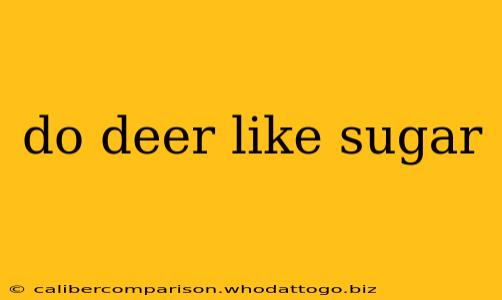Deer, those graceful creatures often spotted in forests and fields, have a diet that's far more complex than you might think. While their primary food source is vegetation, the question of whether they like sugar is a bit more nuanced. This article delves into the deer's dietary habits, the role of sugars in their nutrition, and the potential consequences of feeding them sugary treats.
Deer's Natural Diet: A Primarily Forage-Based System
Deer are herbivores, primarily browsing on a variety of plants. Their diet consists mainly of:
- Forbs: These are broad-leaved herbaceous plants, providing essential nutrients and fiber.
- Grasses: Deer consume grasses, especially in open fields and meadows, though they prefer forbs when available.
- Shrubs and Twigs: Woody plants provide a significant portion of their winter diet, offering sustenance when other food sources are scarce.
- Fruits and Nuts (Seasonally): These provide supplementary energy and essential vitamins and minerals, but aren't the core of their diet.
These natural food sources contain naturally occurring sugars, but in far lower concentrations than processed sugars found in human foods. The sugars present in plants are typically in the form of fructose and glucose, integral parts of plant cells and utilized by deer for energy.
Why Deer Don't Need Added Sugar
Deer's digestive systems are adapted to process fibrous plants efficiently. Their digestive tracts are long and contain specialized microorganisms that break down cellulose and other complex carbohydrates. Added sugars, especially refined sugars like sucrose (table sugar), offer no nutritional benefit and can be detrimental to their health.
The Dangers of Feeding Deer Sugar
While a small amount of natural sugar from fruits won't significantly harm a deer, offering them human foods containing high concentrations of refined sugars is extremely risky:
- Dental Problems: Sugar can lead to tooth decay and other dental issues, potentially causing significant pain and discomfort.
- Metabolic Disorders: Excessive sugar intake can disrupt their metabolism, leading to obesity, diabetes, and other health problems.
- Nutritional Imbalances: Sugary treats displace the necessary nutrients found in their natural diet, leading to deficiencies.
- Dependence and Behavioral Changes: Regular feeding of sugary foods can make deer dependent on humans for food, leading to habituation and potentially dangerous interactions.
- Exposure to Disease: Contact with humans and human food can expose deer to diseases and parasites.
Understanding the Attraction to Sweet Foods
While deer don't inherently crave sugar in the way humans do, they are attracted to sweet-tasting substances. This attraction is likely due to the naturally occurring sugars in fruits and other palatable plants. However, this attraction can be easily exploited by offering them artificially sweetened foods, leading to the health problems mentioned above.
Conclusion: Leave the Sugar for Yourself
In conclusion, while deer will likely consume sugary foods if offered, it's crucial to understand that doing so can have severe health consequences for these animals. Their natural diet provides all the necessary nutrients, and added sugars offer no benefit and pose significant risks. Observing deer in their natural environment and respecting their dietary needs is the best way to ensure their well-being. Resist the urge to feed them human food, including sugary treats. Their health and survival depend on it.

